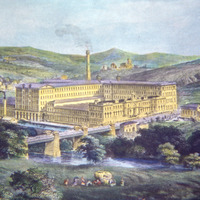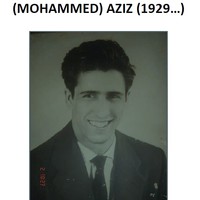2023.2: The life and work of Mohammed Aziz 1929-
Item
- Identifier
- 2023.2
- Title
- The life and work of Mohammed Aziz 1929-
- Type
- Format
- Date Created
- 2021
- Creator
- Smith, Maggie
- Description
- A personal history given by Aziz of his migrating to the United Kingdom to work in the textile industry. Aziz worked at Salts Mill in the 1980s during its last few years before closure. Aziz gave this account of his life to Saltaire Collection volunteer Maggie Smith.
- Associated person or organisation
- Aziz, Mohammed
- Associated place or event
- Source
- Gift: Smith, Maggie
- Rights
- Only viewable in the Saltaire Collection
- Rights Holder
- Copyright Maggie Smith
- Access Rights
- To view the full story please contact the Saltaire Collection
- Abstract
-
Mohammed Aziz (who prefers to be known as Aziz) was born in the village of Chattroh, Mirpur, Azad Kashmir, India in 1929, long before the partition of India and the establishment of the new nation of Pakistan, where his birthplace is now located. His village was in the area affected by the later building of the Mangla Dam but was too high up the mountain to be wiped out by the dam. While the village residents were not badly affected by the mass migration of Muslims from India during partition in 1947, they heard the horror stories about the many deaths that occurred at that time.
After Aziz completed his education in 1952 he went to Karachi to look for work. He was able to get a job through the support of a cousin who recommended Aziz and he began work in the postal service. He was employed there from 1952 to 1957 and his wage was 75 Rupees per month. He felt lucky to have that salary at this point in time.
His father Ghulab Khan was a merchant seaman and travelled the world collecting and delivering products. In the early 1950s Ghulab had docked in Liverpool, England and decided to live and work in England as there were many job opportunities that offered more stability. After finding work in the textile industry in Bradford, Ghulab sent for Aziz to come to England to find similar work.
At that time Aziz did not need a visa or work permit to enter England as the British Nationality Act of 1948, gave all Commonwealth citizens free entry into Britain. He was able to travel quite cheaply from Karachi to England. He recalls arriving at Heathrow Airport, then getting on a coach to Kings Cross to travel by train to Bradford. When he got off the train in Bradford, with little spoken English, he sought help from a couple at Forster Square Station who were very helpful. Aziz found taht during his first years in England the majority of English people were very helpful.
After meeting and falling in love with an English woman however, both the English and Asian communities disapproved. After marrying, Aziz left the textile job he had in Bradford and moved to the South of England to get away from the hurtful prejudice toward them both. Before long, they were drawn back to Bradford where Aziz gained employment in Dawson’s Mill, Thornton, as a worsted textile spinner. Aziz had gained reading and writing skills and he was given the job of ‘ticking off’ the output of other workers, checking the number of hours worked and the weight of the yarn each worker had completed. Aziz’s wage was £7 each week and an extra 10 shillings (50 pence) for the work he oversaw. After a short time the managing director of Dawson’s ensured that he was promoted to the position of overlooker. Aziz worked in a number of other textile mills in Bradford before being accepted at Salts Mill as a spinning overlooker. At this point other white overlookers objected to his appointment, but the manager stood firm and Aziz became the first Asian overlooker at Salts.
Through his many experiences of prejudice, Aziz realised the importance of providing advice to others. In 1982 Aziz founded and directed the AK Action Bureau to conduct local immigration advice work. Its first offices were at 19 Durham Terrace, Bradford. He became a fully licensed Immigration Advisor in 1990 and continued this work, outside his paid employment until aged 90 years. Today, in 2023, he continues to offer his wealth of knowledge and experience within his community. - Has Format
- image
- Item sets
Export
Catalogue data (excluding media) available under Creative Commons Attribution-ShareAlike (CC BY-SA 4.0) licence.

